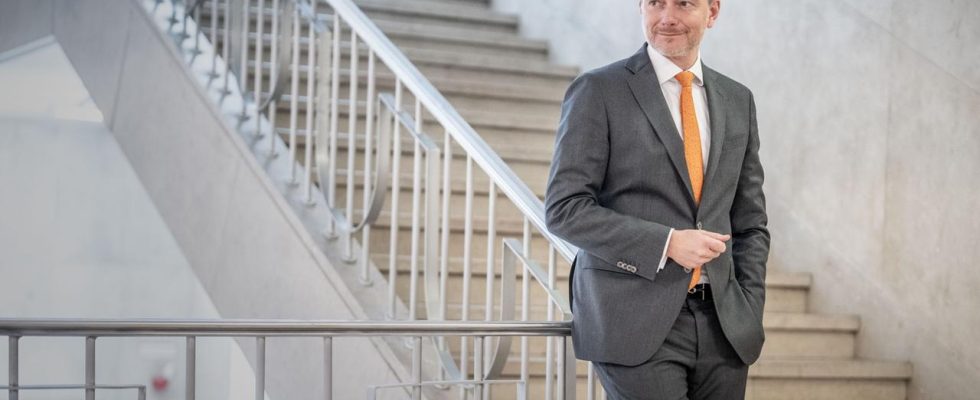Nothing to distribute, but a lot of investment needed: Finance Minister Lindner suggests paying off the Corona debt later and thus strengthening the defense budget. And thus irritates the traffic light partners.
The federal government struggled for a long time about its finances after the Federal Constitutional Court’s ruling. The fiscal policy view of the future has recently appeared dampened by multiple crises: the economy is weakening, and at the same time the Bundeswehr needs to be better equipped in the long term.
With an optimistic look into the future, Finance Minister Christian Lindner has now spoken out about the Easter holidays. In one of several advances, he told the dpa news agency that he sees scope of up to nine billion euros to increase the defense budget from 2028.
New debt should be pressed
If, with disciplined budget management, the Federal Republic’s new debt falls below the prescribed 60 percent of economic output, the repayment plan could be adjusted to repay the loans taken out during the Corona crisis – according to Lindner’s considerations.
A very realistic scenario, because according to the Federal Ministry of Finance, the rate has already fallen to 63 percent in 2021, after a level of 69 percent. The Basic Law stipulates that the repayment of such loans must take place over an “appropriate period of time” – a flexible term, but the Bundestag would have to decide in the end.
Mixed reactions in the SPD
There are mixed reactions to Lindner’s nine billion thought game from the traffic light partner SPD. Their budget policy spokesman Dennis Rohde welcomes the Finance Minister’s proposal: It makes “economic sense to always assess the question of debt repayment in the overall budgetary situation,” Rohde told the ARD capital studio. So: If the German debt ratio is below 60 percent in 2028, one could start paying off the pandemic debt later – and put the freed-up funds into security and defense: “The modernization of our Bundeswehr must continue to be kept at a record pace and the NATO Goals in the federal budget must be pursued stringently.”
In contrast, Rohde’s parliamentary group colleague, SPD budget politician Andreas Schwarz, says that the nine billion euros brought into play by Lindner are “not even remotely” enough. In an interview with the Bayern media group, Schwarz argues that the money in the federal budget for security and defense should not be dependent on Corona repayments. Otherwise you would send “the wrong signal to Putin and our allies.”
Greens recognize their own proposal
The Green Party’s budget spokesman, Sven-Christian Kindler, emphasizes that Lindner’s proposal is an old proposal from his party. The Greens had already suggested extending the repayment of the emergency loans in 2021. However, this does not solve “the fundamental problems in the household,” Kindler told the ARD capital studio.
The debt brake is also an issue again
Instead, Kindler is once again calling for negotiations on easing the debt brake because, on the one hand, Germany has one of the lowest debt ratios of all industrialized countries in the world, but at the same time has a large investment deficit and is facing a major economic and ecological transformation. “Otherwise we put on a corset that is far too tight, which slowly takes away our ability to breathe,” says Kindler. “We know that in times of crisis, tough austerity measures increase social conflicts and prolong the economic crisis.”
And in doing so, Kindler, the Green Party’s housekeeper, is shifting the debate in a direction that Lindner absolutely did not want. It was only on the Easter weekend that the FDP minister called on his coalition partners to accept the debt brake – something like the FDP’s sacred cow – and ideally not to argue about it anymore until the 2025 federal election. Lindner told the dpa: “This permanent disunity is damaging for the external image of the coalition.”
An appeal that has been heard frequently over the past two years – and similarly often ignored.
Martin Polansky, ARD Berlin, tagesschau, April 2nd, 2024 8:26 a.m

